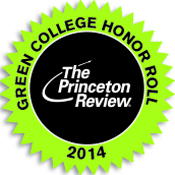UC Santa Cruz is one of 22 colleges and universities to receive a 99, the highest score in the Princeton Review's sixth annual "Green Honor Roll."
The publication compiled a "Green Rating" on 832 colleges based on data collected in its 2012-13 surveys concerning sustainability-related practices, policies and academic offerings. UCSC was cited for its commitment to sustainability in academic offerings, campus infrastructure, activities, and career preparation. Other UCs on the list were Irvine, Los Angeles, and Santa Barbara.
As it notes: "Already, the campus boasts a 64 percent waste-diversion rate and gets 16 percent of its energy from renewable sources. Facilities services are also becoming more environmentally responsible, using 90 percent Green Seal-certified cleaning products. These impressive numbers are leading the campus toward its goal of zero waste by 2020."
Princeton Review said its Green Ratings are a reference for students' rising interest in the quality of campus life. A university's commitment to the environment has proven to have an impact on student application and acceptance decisions, the publication said in announcing its findings.
Green Rating scores covered three areas: healthy, sustainable campus life; student preparation for future environmental challenges; and an institution’s overall commitment to environmental issues.The Princeton Review developed its "Green Rating" criteria in 2007 with ecoAmerica, a non-profit environmental organization. The survey includes questions about the school's energy use, recycling, food, buildings, and transportation as well as academic offerings and sustainability-related action plans.
Additionally, Princeton Review has joined with the Association for the Advancement of Sustainability in Higher Education (AASHE), Sierra magazine, and the Sustainable Endowments Institute (SEI) to collaborate on the reporting process for institutions that choose to participate in various higher education sustainability assessments. The intent is to reduce and streamline the amount of time campus staff spend tracking sustainability data and establish the Campus Sustainability Data Collector (CSDC).
The Princeton Review tallied its "Green Rating" scores based on responses to a 2012-13 institutional survey that asked:
1) The percentage of food expenditures that goes toward local, organic or otherwise environmentally preferable food.
2) Whether the school offers mass transit programs, bike sharing, facilities for bicyclists, bicycle and pedestrian plans, car sharing, carpool discount, carpool/vanpool matching, cash-out of parking, prohibiting idling, local housing, telecommuting, and condensed workweek.
3) Whether the school has a formal committee with participation from students that is devoted to advancing sustainability on campus.
4) Whether buildings that were constructed or underwent major renovations in the past three years are LEED certified.
5) The school’s overall waste diversion rate.
6) Whether the school has an environmental studies major, minor or concentration.
7) Whether the school's students graduate from programs that include sustainability as a required learning outcome or include multiple sustainability learning outcomes.
8) Whether the school has a formal plan to mitigate its greenhouse gas emissions.
9) The percentage of the school's energy consumption that is derived from renewable resources.
10) Whether the school employs a dedicated full-time (or full-time equivalent) sustainability officer.



